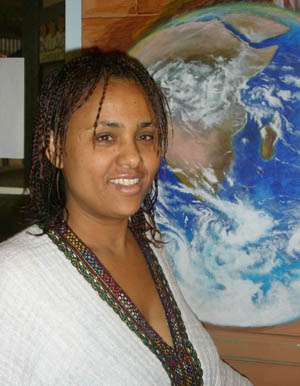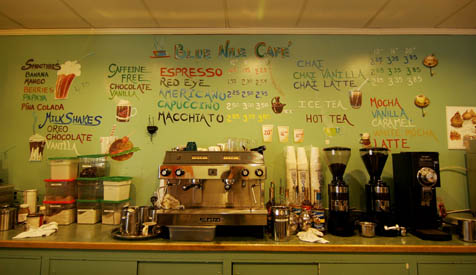Almaz Damanias and the Blue Nile Cafe
Ethiopian Tastes and Tales

The Blue Nile Cafe is one of those tucked-away gems that you may miss entirely unless you’re lucky enough to have someone call it to your attention. And now you are. A little bit of Ethiopia nestled incongruously in the heart of Solvang, it is run with grace and care by Almaz Damanias, whose pride in her Ethiopian heritage is evident in everything she does. I knew something special was going on here when Damanias greeted me with a tiny china cup of rich black Ethiopian coffee-and believe me, Italian espresso has nothing on this stuff. “Of course it’s the best,” said Damanias, “My country is where coffee started.”
There followed a feast of spiced lentils-the distinctive spice is a red pepper called berberi-and other vegetables, served on a large platter and eaten without the bother of utensils, scooping up savory mouthfuls with torn-off bits of a soft bread called injera. Ethiopian tortillas? Not quite. These are spongier and more crpe-like, so airy light you can see the tiny bubbles. Afterward, Damanias served hot ginger tea, slightly sweet and deliciously aromatic.
For me, however, a big part of the Blue Nile experience is talking to Damanias, a remarkable woman with stories to tell. A descendent of the Tigrinya tribe (as was the Queen of Sheba), she was born in a small village in northern Ethiopia near Mekele. “My village was beautiful,” she told me. “I remember goats and sheep and farms, and children gathering to sing and play. The parents would come out and give us snacks of bread or salted oatmeal, and there was fresh roasted corn, and potatoes placed in ashes to cook, then peeled and eaten. We did not have much, but because of that, I learned to appreciate little things.”

Damanias was nine years old when her family sent her off to friends in Asmara, a city in Eritrea, an adjacent state that had been annexed by Ethiopia in 1961. Her family believed she would have more opportunities and a better life there. Recalling the day she left her village, she said, “There were two great fig trees, centuries old, and everyone gathered under those trees to say good-bye to me, and I walked out of the village, past the mountains, and all the way to the town, where I took the bus to Asmara for the life that was supposed to be better. I did not understand that I was losing my country and leaving my family forever. I just did what I was told. But I was so homesick. I memorized my village. I dreamed about it every night. I still do.”
Damanias was working in a bakery in Asmara in 1990 as the ongoing Eritrean war for independence from Ethiopia escalated and Asmara was besieged. “I was a very young girl,” she explained, “and the political situation was confusing to me. I didn’t know how to put it together. I just knew there was war, and it was not a war faraway, but a war right there in the city, with dead people in the streets. We were always scared. The children could not be children. The young people could not explore and be young. But somehow you had to survive.”
In 1994 Damanias was given the opportunity to move to California, where her future husband and his mother had relocated ahead of her. Not knowing what to expect, she once again left the familiar for the promise of a better life. “Everyone told me I would be crazy not to go,” she recalled, “and they hugged me and wept and wished me well. So I lost my country a second time.” She realizes how fortunate she is to have somehow landed in the Santa Ynez Valley, but one day-perhaps when her eldest son Massimo is 16-she hopes to return to her village for a visit. Her mother and siblings are still there, and she would love to stand again beneath the fig trees where everyone once waved good-bye.
In the meantime, with the Blue Nile Cafe, Damanias has found a way to bring Ethiopia here. To request an Ethiopian meal, you need to call two or three days ahead and let her know you’re coming, but trust me: it is worth it. While you’re there, you can also admire the murals and artwork by her husband Gaimbero. And if you just happen to be in the neighborhood and haven’t planned ahead, you can still stop at the Blue Nile for sandwiches, pastries, and good robust coffee drinks, not to mention fast, free Internet access. But do say hello to Damanias, who will be quietly doing beautiful things with pride and care, Ethiopian style.
“Everyone associates Ethiopia with hunger and famine,” she said, “but it is an old civilization and a beautiful place where people are friendly and accepting. I am so proud of who I am and where I came from.”
4•1•1
The Blue Nile Cafe is located at A-107 Denmarket Square, Alisal Road and Mission Drive, in Solvang. Call 693-0814.



